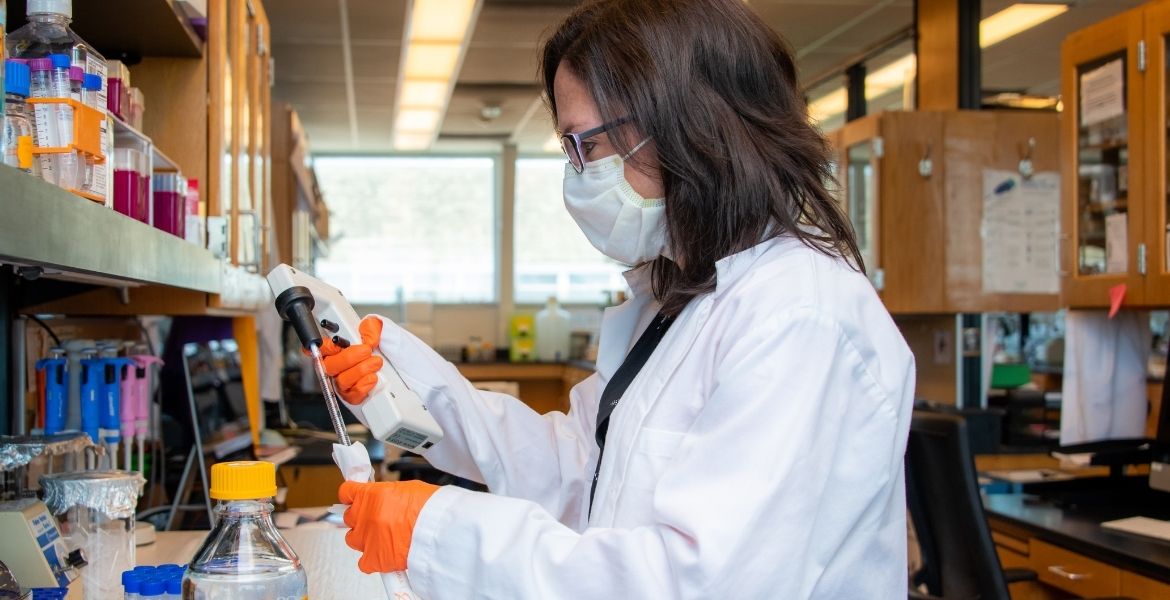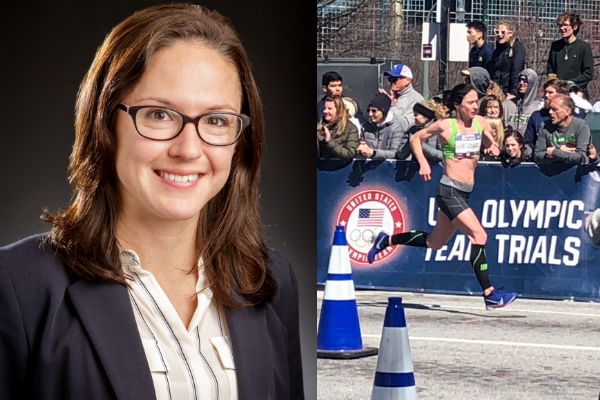
Racing Toward a Cancer Cure
Thursday, December 10, 2020
Dr. McKale Montgomery researches cancer cells’ response to nutrients like iron, an interest she developed while training for the marathon trials for the U.S. Olympic team.
Her iron intake was especially important for running due to its role in circulating oxygen. While monitoring her intake for training, she also conducted graduate research on cellular regulation of iron.
“Iron is a really important nutrient for athletes, so that was my interest,” she said.
After 12 years of training while earning her doctorate, getting married, having a baby and starting a new career as an OSU faculty member, Montgomery achieved her lifelong dream of qualifying for the 2020 U.S. Olympic marathon trials, where she ran a personal best time of 2 hours, 38 minutes and 20 seconds, placing 30th overall.
Through it all, she continued her cancer research.
“There’s not a lot of people looking at tumor cell metabolism who also have a background in nutrition,” Montgomery said. “We found a gene that is mutated in more than half of tumors, and it doesn’t seem to detect when it has too much iron.”
A cancer treatment could target the mutation, making the elevated iron levels toxic to cancer cells while leaving healthy cells unharmed with the amount of iron naturally found in the human diet, Montgomery said.
Dr. Stephen Clarke, Montgomery’s graduate advisor and head of the OSU Department of Nutritional Sciences, said her success in both running and research is not surprising.
“She was incredibly disciplined, which I think came from being a Division I athlete,” Clark said. “She was willing to do whatever it took, so there were times she would be up in the middle of the night taking care of animals.”
Montgomery, who won the 2013 Oklahoma City Memorial Marathon, ran on the OSU track team for one semester as a master’s student.
“She provided leadership in the lab as a graduate student,” Clarke said. “Now as a professor, she has the ability to relate to students in a way that encourages them to work hard and learn the material.”
Bryant Keirns, an OSU nutritional sciences doctoral student, routinely trains with Montgomery for half marathons. He has seen her encouragement firsthand, both in the lab and on the course.
“Her lab is next to ours, and having someone with that much experience in there to ask questions is great,” Keirns said. “She asked me, ‘Do you want to go hard this summer?’ and I said, ‘Yes.’ Then, I thought maybe that was a mistake because I knew she was pretty serious.”

Saturday morning trainings typically begin at the OSU Botanic Garden and transition to softer dirt roads nearby, Keirns said. Keirns completes 13 miles, but Montgomery runs more than 20 miles. Cumulatively, Montgomery said she runs 80 to 90 miles per week.
“Weekdays, I go run at 5 in the morning by headlamp most of the time,” Montgomery said. “On Saturdays, I typically run at least 20 miles, spending a significant portion of that running under a six-minute mile pace.”
Montgomery says she missed the U.S. Olympics marathon trials by one minute in 2012, then by only six seconds in 2016. She hopes to instill this message of resiliency in her students.
“Mentoring is a big part of my work,” she said. “The first hurdle I have to overcome is letting them know we’re all going to make mistakes, but they need to get past that and move on.”
Montgomery mentors two Freshmen Research Scholars through a program that partners new students with established faculty.
“It’s an opportunity I wish I’d had before,” Montgomery said. “I never entered a lab until I started my master’s degree, and I had never held a pipette before, much less conducted an experiment with one.”
Montgomery, familiar with overcoming barriers related to research, has helped her students do the same.
As a testament to her work, her master’s student Laurie Thompson recently won the College of Human Sciences Three-Minute Thesis (3MT) contest and placed second at the universitywide event. Thompson summarized her research with Montgomery on the iron-regulating gene P53 in less than three minutes at a level a lay-person could understand.
“She is unique in the fact that she is so willing to sit and work with us as graduate students and help us any way in the lab,” Thompson said.
Ultimately, Montgomery wants her students to find passion in their studies.
“I think I’m one of the few people in the world that has an alarm go off and gets up because they want to get ready for work to see what happens next,” Montgomery said of both her research and running careers. “I’m really fortunate in that regard.”
MEDIA CONTACT: Brittany Bowman | 540-908-0929 | brittany.bowman@okstate.edu
